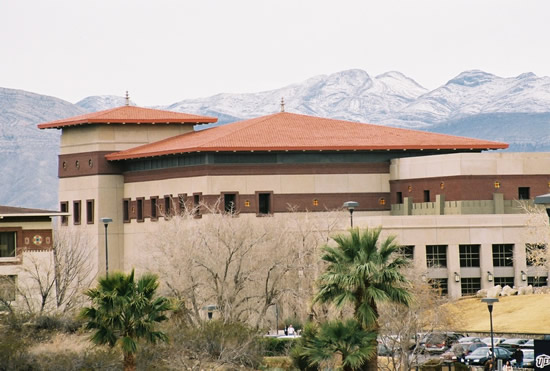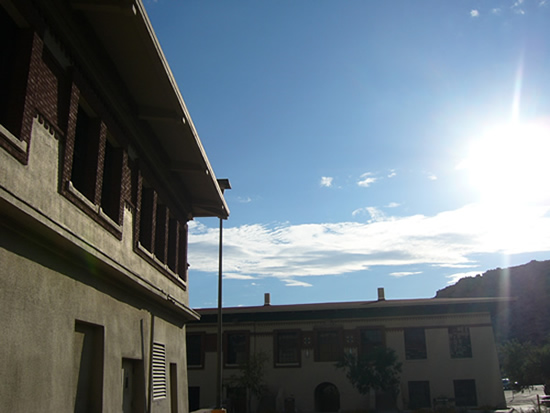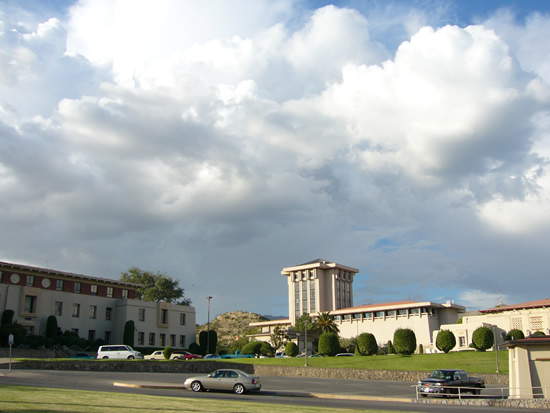Welcome to
CoProD 2009
Constraint programming techniques are important components of intelligent systems. They constitute a nice and easy way to represent many practical situations. They have been applied successfully to a number of fields, such as scheduling of air traffic, software engineering, networks security, chemistry. Despite the proved usefulness of these techniques, they are still under-utilized in real-life projects. One reason might be the lack of effective communication of researchers with domain practitioners about constraints in general and their use in decision making in particular.
CoProD'09 is the second edition of CoProD. CoProD'08 was held successfully in October 2008 at UTEP, bringing together about 30 researchers from constraint programming, optimization, and domain scientists.
CoProD'09 will be held at The University of Texas at El Paso, Union Building, Templenton Suite.
Objectives of CoProD:
- To draw together a network of researchers interested in constraint techniques, in particular researchers and practitioners that use numeric and symbolic approaches (or a combination) to solve constraints and optimization problems.
- To address the gap between the great capacity of these techniques and their limited use.
CoProD aims at encouraging presentation and discussion of on-going work. It also aims at facilitating networking opportunities as well as cross-fertilization between the approaches used in the different attending communities. Therefore, besides participants who participates in research in decision making / constraint programming techniques, we expect to have a wide attendance of domain scientists for their input is extremely valued in this workshop.
Special emphasis:
Although topics are by no mean restricted to the following, this year's edition of CoProD wants to specifically emphasize the topic of tensors as a mean to enhance existing solving algorithms and generate new ones. Expected outcomes of CoProD:
- Definition of new directions for combining numeric and symbolic approaches in solving constraints and optimization problems in particular and in decision making in general.
- Definition of new representations and abstractions (such as tensors) that are expected to enhance solving techniques and collaborations.
- Better connection between actual practitioners and researchers in constraints and decision making.
CoProD'09 has the potential to impact these communities by easing collaborations and therefore the emergence of new techniques, and by creating a network of interest. The objectives of CoProD are also relayed all year round through the website constraintsolving.com.
Invited Speakers:
- Carla Gomes, CS department, Cornell University
- Rina Dechter, Information and Computer Sciences, University of California Irvine
- Purushotham Bangalore, CIS department, University of Alabama at Birmingham
- James Raynolds, College of Nanoscale and Engineering, SUNY Albany
- Francois Modave, CS department, Central Washington University
Participation / Submission:
Participation is encouraged from people doing research in the area of decision making as well as from domain scientists. Submissions are expected in the form of extended abstracts of at least 2 pages and no more than 5 pages, formatted using the standard LNCS/LNAI format. The title page should include the name, address, and email address of each author as well as a list of keywords. Submissions have to be sent in postscript or pdf format AND latex format as well to mceberio [at] utep [dot] edu. A contact author should be specified in the submission email. The deadline for submissions is September 28th.
Proceedings / Publication:
A book of abstracts will be printed and provided to each registered participant.
After the workshop, the program committee will invite the authors to submit a full article version of their work to be published (after a review process) in a Springer book series.
Important dates:
| September 28th: | abstract submission |
| October 5th: | notification of acceptance |
| October 20th: | camera-ready copy of abstracts due AND end of early registration |
| November 9th-10th: | workshop |
Schedule
Monday November, 9th
8:30am — Breakfast
8:45am — Introduction by Dr. Novick and Dr. Ceberio
9:00am — Dr. Mullin
9:45am — Dr. Gelfond / Languages and Systems Integrating ASP and CP Reasoning
10:15am — Dr. Pownuk / Applications of Higher Order Monotonicity Tests to the Solution of
Equations with the Interval Parameters
10:45am — Dr. Modave / Constraints and Decisions in the Identification of Rare Diseases
11:15am — Dr. Kreinovich / Continuous If-Then Statements Are Computable
11:45am — Lunch break
12:45pm — M. Koshelev / Gibbs Sampling as a Natural Statistical Analog of Constraints
Techniques: Prediction in Science under General Probabilistic
Uncertainty
1:15pm — Dr. Kreinovich / Why Tensors?
1:45pm — Dr. Raynolds / Tensors and n-d Arrays: A Mathematics of Arrays (MoA) and the psi-
Calculus
2:15pm — Coffee break
2:40pm — Panel Discussion
4:00pm — End of Day 1 of CoProD’09
Tuesday November, 10th
8:30am — Breakfast
8:45am — Dr. Taboada and O. Aguirre / Multiple objective optimization for the all- terminal
network reliability problem
9:15am — V. Chenna and Dr. Espiritu / Ant Colony Optimization for Power Distribution Systems
9:45am — K. Gutierrez, N. Chavez, and Dr. Taboada / Applications of multiple objective
optimization in electricity transmission and distribution
systems
10:15am — Coffee break
10:45am — Dr. Selman / Bridging probabilistic reasoning and constraint satisfaction
11:15am — Dr. Dechter / Advanced Strategies for Processing Mixed Probabilistic and
Constraint-Based Graphical Models
11:45am — Lunch break
12:45pm — Dr. Flores / High Range Resolution Radar Signals Using the Lorenz Chaotic Flow
1:15pm — Dr. Clark and B. Clark / Need for Constraint Programming in Real-time Diagnostic
Medicine
1:45pm — Dr. Magoc / Optimization of the Choquet Integral using Genetic Algorithms
2:15pm — Coffee break
2:45pm — Dr. Kreinovich / Selecting the Best Location for a Meteorological Tower: A Case
Study of Multi-Objective Constraint Optimization
3:15pm — Dr. Magoc / Using Preference Constraints to Solve Multi-criteria Decision Making
Problems
3:45pm — Closing remarks (Dr. Ceberio)

















Organization
| Main Organizer: | Martine Ceberio |
| Student Organizers: | Paden Portillo Adrian Franco |
Location
The University of Texas El Paso, Union Building, Templeton Suite.
See campus map
The workshop will be held at The University of Texas at El Paso, in the Union Building, Templeton Suite (3rd floor).
Discover a city that stretches the imagination - El Paso, Texas' westernmost city. A city of nearly three-quarters of a million people, which sprawls across hundreds of square miles of desert and rambling foothills. The Franklin Mountains, southern tip of the Rockies, slice El Paso nearly in two. With its classic Western geography and tri-cultural history, El Paso makes an intriguing place to visit.
El Paso is the gateway to Juarez, Mexico (US citizens do not need a visa for a short visit across the border), and to southern New Mexico with such recognized attractions such as Fort Bliss, Carlsbad Caverns and White Sands National Memorial.
El Paso's dry, sunny, warm desert climate earned the city the nickname “Sun City”.
Contact Info
Martine Ceberio
CoProD'2009
Department of Computer Science
The University of Texas at El Paso
500 West University
El Paso, TX 79968-0518
mceberio (at) utep (dot) edu


